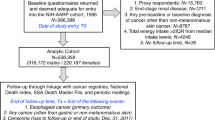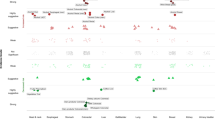Abstract
Objective: The aim of the present study was to elucidate the influence of social, dietary and environmental factors on the incidence of malignant epithelial tumours in the upper digestive tract and on the prognosis of patients with these cancers.
Design: A population-based case-control study was carried out, and the patients in the study were included in a survival analysis.
Setting: The study was carried out at the Department of Otorhinolaryngology at Ullevål University Hospital, Oslo, Norway.
Subjects: In the case-control study, 84 patients and 89 controls were included. Only the patients were included in the survival analysis.
Results: Smoking showed the highest odds ratio (OR) for morbidity (OR=29). The patients had in general a lower social status, and a higher alcohol intake (OR=6.6). For both β-carotene and vitamin C, the ORs decreased with increasing intake (OR=0.2 and 0.3, respectively). Increased ORs were associated with low values for haemoglobin, iron, TIBC, folic acid, magnesium and especially for albumin (OR=14), and with high values for ferritin, vitamin B12 and thiocyanate (a marker for smoking). Stage of the disease was an important prognostic factor. The relative risk (RR) of dying for disseminated vs localised tumours being 3.2. A poorer prognosis was linked to higher age, to smoking vs no smoking (RR=2.3), and to lower levels of haemoglobin, albumin, magnesium and thiocyanate.
Conclusions: Strong beer, liquor, consumption of milk and table fat, low social status and smoking seemed to have a negative impact on both disease and survival. Fruit and vegetables might, however, reduce the risk. Whereas low serum albumin, iron and magnesium indicated a high OR for cancer, vitamin C and β-carotene had the opposite implication. No significant implications on survival could be detected in blood chemistry beyond the stage of disease.
Consent procedures: The study was approved by the Norwegian Data Inspectorate. No remarks were given from the Hospitals ethical committee.
Sponsorship: The study was supported by the Norwegian Cancer Society.
This is a preview of subscription content, access via your institution
Access options
Subscribe to this journal
Receive 12 print issues and online access
$259.00 per year
only $21.58 per issue
Buy this article
- Purchase on Springer Link
- Instant access to full article PDF
Prices may be subject to local taxes which are calculated during checkout
Similar content being viewed by others
Author information
Authors and Affiliations
Rights and permissions
About this article
Cite this article
Freng, A., Daae, L., Engeland, A. et al. Malignant epithelial tumours in the upper digestive tract: a dietary and socio-medical case-control and survival study. Eur J Clin Nutr 52, 271–278 (1998). https://doi.org/10.1038/sj.ejcn.1600548
Received:
Revised:
Accepted:
Published:
Issue Date:
DOI: https://doi.org/10.1038/sj.ejcn.1600548



